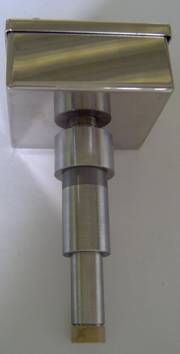Product Brief
The Flocon RGI Mass Flow Meter provides accurate, real-time measurement of mass flow in pneumatic transport systems using advanced 24 GHz microwave radar technology. It offers a precise, non-contact solution to determine the amount of material flowing through pipes, making it ideal for industrial process control.
Product
Description
The Flocon mass flow meter employs microwave radar principles similar to Doppler speed detection but uses microwaves at 24 GHz frequency to measure particle density in pneumatic pipelines.
As microwaves pass through the material, their energy attenuates proportionally to the mass of particles present. By measuring both particle density and flow velocity, the meter calculates the mass flow rate as mass per unit of time.
The sensor is installed via an adapter welded onto the pipe, featuring a ceramic end to resist abrasion. The sensor outputs signals transmitted to an evaluation unit capable of displaying flow measurements in various units and providing analog and digital outputs for integration with industrial systems. The unit includes automated calibration capabilities, alarm thresholds, and communication interfaces.

Product
Applications
Accurate mass flow measurement ensures optimal loading rates in crushers, pulverizers, and storage silos, preventing overloading or spillage
Precise mass flow data helps maintain correct feed rates in reactors, mixers, and conveyors, ensuring product consistency and process efficiency.
Its ability to integrate with process automation aids in maintaining stringent quality control standards and minimizing product loss while enhancing operational efficiency.
Monitoring mass flow in raw materials transport and blending.
Powders, grains, and particulate ingredients are often transported pneumatically for processing, packaging, or storage. It ensures consistent product formulation, maintaining quality and safety standards.
Tracking seed, feed, and fertilizer flow in pneumatic conveying systems.
Key
benefits
Non-contact, robust measurement resistant to abrasion and wear.
(±0.5%) and automated calibration.
For industrial system integration.
Compact, IP65-rated enclosure for harsh environments.
Flexible calibration and diagnostics, including alarm relays and watchdog.
Multiple unit displays (kg/s, tons/hr) configurable per region.
Minimal maintenance due to ceramic sensor tip and sealed design.
Installation
Types
- The mass flow meter sensor is installed by welding an adapter with a bore hole into the pneumatic transport pipe.
- The sensor mounts onto the adapter externally without direct contact with the material flow.
- The evaluation unit is connected by a 4-line cable for signal processing and output generation.
Mechnical & Technical
Specifications
Sensor pipe hole diameter: ~20 mm.
Ceramic for high abrasion resistance.
101.4mm (W) x 132.5mm (H) x 160mm (D).
318g (without housing).
Operating ambient temperature: 0 to 55°C.
Planetary, worm, or helical reducer with AC/DC drive options
Why Choose Our Flow Meter for Pneumatic Transport?
Based on Doppler radar principles, 24 GHz microwaves transmitted through the particle stream attenuate in proportion to particle density. Velocity measurement complements this to calculate mass flow rate (mass/time). The ceramic sensor ensures durability while the evaluation unit facilitates calibration, diagnostics, and integration with control systems.